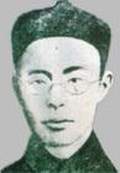Xu Xilin
Xu Xilin (1873 – July 7, 1907) was a revolutionary figure in the late Qing Dynasty of China, known for his role in planning and leading an uprising against the Qing government. This event was part of a broader movement aimed at overthrowing the Qing Dynasty and establishing a republic in China, which eventually culminated in the Xinhai Revolution of 1911.
Early Life[edit | edit source]
Xu Xilin was born in 1873 in Anhui Province, China. From a young age, he was exposed to the ideas of reform and revolution, which were circulating among intellectuals and political activists in China at the time. These ideas were a response to the internal crises and external threats that China faced in the late 19th and early 20th centuries, including the Opium Wars, the Taiping Rebellion, and the imposition of "unequal treaties" by foreign powers.
Political Activism[edit | edit source]
Xu Xilin became actively involved in the anti-Qing movement in the early 20th century. He was influenced by the revolutionary ideas of Sun Yat-sen and joined the Tongmenghui, a revolutionary alliance founded by Sun in 1905 that aimed to overthrow the Qing Dynasty and establish a republic. Xu's commitment to the revolutionary cause led him to take on significant risks, including planning and participating in armed uprisings.
The Anqing Uprising[edit | edit source]
The most notable of Xu Xilin's revolutionary activities was his leadership in the Anqing Uprising in 1907. The uprising took place in Anqing, Anhui Province, and was planned as a coordinated attack against the Qing government officials and military installations in the city. Xu Xilin was responsible for infiltrating the local police force and organizing the revolutionaries within Anqing.
However, the uprising was betrayed before it could be fully implemented, and Xu Xilin was captured by Qing forces. Despite being subjected to torture, he refused to reveal information about his fellow revolutionaries. Xu Xilin was executed by beheading on July 7, 1907.
Legacy[edit | edit source]
Xu Xilin's sacrifice became a source of inspiration for future generations of Chinese revolutionaries. His actions and dedication to the overthrow of the Qing Dynasty and the establishment of a republic are commemorated in Chinese history as exemplifying the spirit of sacrifice for the nation.
Following his death, the anti-Qing movement continued to gain momentum, leading to the successful overthrow of the Qing Dynasty in the Xinhai Revolution of 1911. This revolution ended over two thousand years of imperial rule in China and led to the establishment of the Republic of China.
See Also[edit | edit source]
Search WikiMD
Ad.Tired of being Overweight? Try W8MD's physician weight loss program.
Semaglutide (Ozempic / Wegovy and Tirzepatide (Mounjaro / Zepbound) available.
Advertise on WikiMD
|
WikiMD's Wellness Encyclopedia |
| Let Food Be Thy Medicine Medicine Thy Food - Hippocrates |
Translate this page: - East Asian
中文,
日本,
한국어,
South Asian
हिन्दी,
தமிழ்,
తెలుగు,
Urdu,
ಕನ್ನಡ,
Southeast Asian
Indonesian,
Vietnamese,
Thai,
မြန်မာဘာသာ,
বাংলা
European
español,
Deutsch,
français,
Greek,
português do Brasil,
polski,
română,
русский,
Nederlands,
norsk,
svenska,
suomi,
Italian
Middle Eastern & African
عربى,
Turkish,
Persian,
Hebrew,
Afrikaans,
isiZulu,
Kiswahili,
Other
Bulgarian,
Hungarian,
Czech,
Swedish,
മലയാളം,
मराठी,
ਪੰਜਾਬੀ,
ગુજરાતી,
Portuguese,
Ukrainian
Medical Disclaimer: WikiMD is not a substitute for professional medical advice. The information on WikiMD is provided as an information resource only, may be incorrect, outdated or misleading, and is not to be used or relied on for any diagnostic or treatment purposes. Please consult your health care provider before making any healthcare decisions or for guidance about a specific medical condition. WikiMD expressly disclaims responsibility, and shall have no liability, for any damages, loss, injury, or liability whatsoever suffered as a result of your reliance on the information contained in this site. By visiting this site you agree to the foregoing terms and conditions, which may from time to time be changed or supplemented by WikiMD. If you do not agree to the foregoing terms and conditions, you should not enter or use this site. See full disclaimer.
Credits:Most images are courtesy of Wikimedia commons, and templates Wikipedia, licensed under CC BY SA or similar.
Contributors: Prab R. Tumpati, MD

